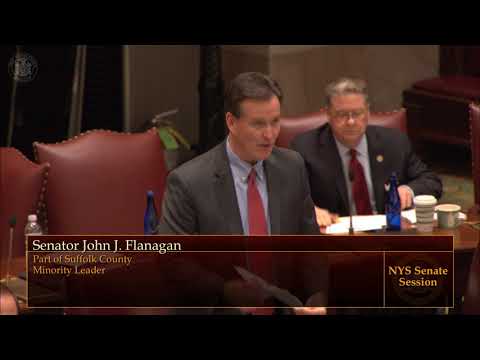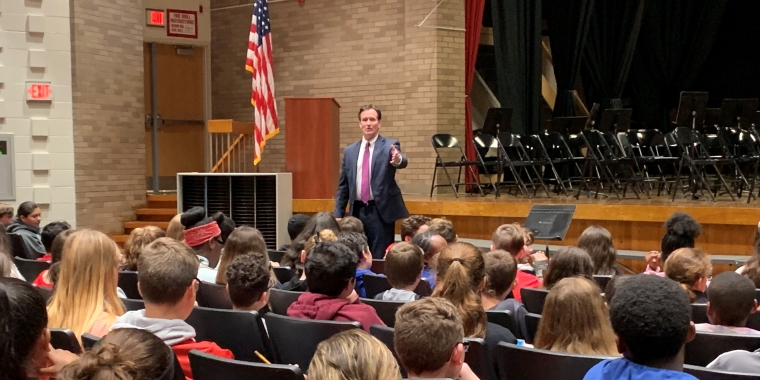
Senate Passes Historic Package Of ‘Good Government’ Reforms That Will Boost Accountability, Transparency, and Prevent the Misuse of Taxpayer Money
May 9, 2018

The New York State Senate today passed the most sweeping package of good government reforms proposed in years. The measures will help ensure taxpayer monies are invested in effective programs, prevent real or perceived conflicts of interest and enhance transparency in government dealings, and increase the accountability of public officials.
Senate Majority Leader John J. Flanagan said, “It is imperative that the public trusts the actions of their public officials, especially when it comes to spending the people’s money. This extensive package would help fix many of the issues that lead to corruption and the misuse of taxpayer funds and will create a system where sound investments will be better able to grow our economy and create more opportunities for all New Yorkers. They are important bills - many with Assembly sponsors - and they should be enacted this session.”
The bills passed by the Senate today include:
Preventing the Appearance of “Pay-to-Play”
S8409, sponsored by Senator Michael Ranzenhofer, limits political donations from parties applying for grants, licenses, or doing business with public entities to the public officials or candidates who would approve such grants, licenses, or contracts. Unfortunately, disclosures of significant donations by people or businesses who have received significant public contracts or licenses gives rise to public suspicion that there may be a relationship between the two occurrences, and thus to public cynicism and distrust of the process of how public bodies make decisions.
Prohibiting Certain Political Contributions by Government Appointees
S8404, sponsored by Senator Ranzenhofer, prohibits appointees who are appointed by the Executive to make political contributions to the Executive or his or her political campaign. The appointees would be prohibited from making political contributions within a year of appointment, during their term, and for a year after the term ends. It also prohibits the appointee from soliciting contributions on behalf of the Executive or the Executive's campaign committee. This prohibition also applies to members in the appointee's household.
A February 2018 New York Times article profiled a current trend whereby Executive appointees have made political contributions to the Executive totaling nearly $900,000. An atmosphere where appointees operate under the practice of making routine political contributions to the individual appointing them to their positions fosters skepticism and distrust of the political process in Albany, and leads hardworking citizens to believe that Albany in rife with a "pay-to-play" culture.
Senator Ranzenhofer stated, “From bid-rigging scandals to corruption trials, hard-working New Yorkers are fed up with the lack of ethics in state government, and the time is now for real reforms. Private companies should not be allowed to make campaign contributions to politicians while under consideration for state contracts. Appointed officials of the Executive branch should not be permitted to make political contributions to the Governor's re-election campaign. Allowing these practices to continue will only foster distrust and skepticism of the process in state government. These reforms will help to end Albany's pay-to-play culture and restore the public's trust in their state government.”
Requiring Financial Disclosure for Regional Economic Development Council Members
S922B, sponsored by Senator Thomas Croci, codifies the existing Regional Economic Development Councils (REDC) and requires appointees to comply with financial disclosure requirements and the code of ethics that all other public officers are currently bound by.
Since 2011, the Governor has appropriated more than $5.4 billion dollars to thousands of projects, through the Councils. The REDCs were never formally adopted into statute, giving the Governor the unrestricted ability to appoint the individuals who are at least partially responsible for determining the future of the State's economic development. REDC members are also unilaterally appointed by the Governor and not subject to the financial disclosure requirements of the public officers law, resulting in no way for the public to be assured that there are no conflicts of interest or members engaging in self-serving activities. This bill would make the REDCs more transparent through increased public disclosure and further assure New Yorkers that their tax dollars are being allocated in an appropriate manner.
“Regional Economic Development Councils were supposed to have been created to find and fund transformational projects. This legislation is the type of transformational ethics shake-up that New Yorkers want from Albany. I am proud to once again push for reform to increase oversight and accountability to the REDC’s. It is vitally important that we put laws in place that prevent conflicts of interest with taxpayer dollars,” said Senator Croci.
Developing a Searchable Subsidy Database
S6613B, sponsored by Senator Croci, requires the creation of a searchable state subsidy and economic development benefits database that would benefit New Yorkers and policy makers by helping monitor the use of taxpayer money used to grow our state's economy and create jobs.. The database would include the name and location of the participant; the time span of received economic development benefits; the type of benefit received; the total number of employees at all sites of a project; the number of jobs a participant is obligated to retain and create during the project; the amount of economic development benefits received for the current reporting year; and a statement of compliance indicating if any other state agency has reduced, cancelled or recaptured economic development benefits from a participant.
Creating the New York State Procurement Integrity Act
S3984A, sponsored by Senator John DeFrancisco, prevents self-dealing in the government procurement process by enhancing the integrity, transparency, and accountability of the state’s procurement process. Historically, the Office of the State Comptroller (OSC) has performed this essential oversight function, but in recent years OSC's ability to do so has been eroded by executive and legislative action. The bill, called the New York State Procurement Integrity Act, would:
- restore the state Comptroller's independent oversight (eliminated in 2011 and 2012) of SUNY, CUNY, and OGS centralized contracts;
- expand the Comptroller's oversight of the procurement process to include contracts in excess of $1 million awarded by the SUNY Research Foundation; and
- prohibit state contracting through state-affiliated not-for-profit (NFP) entities unless explicitly authorized in law.
Protecting State Investments When Deals Don’t Meet Expectations
S7697A, sponsored by Senator DeFrancisco, ensures that the Public Authorities Control Broad members have sufficient information to make informed decisions prior to a vote approving funding and includes disclosure of a claw-back provisions for instances when a project job creation claim doesn’t come through, the state could recoup funding.
Senator DeFrancisco said, “I am pleased that my Senate colleagues and I were able to pass legislation that will provide much needed transparency for New York taxpayers. By bolstering accountability we are ensuring that New Yorkers' hard-earned money is being spent efficiently.”
Creating an Independent Budget Office
S2325, sponsored by Senator Joseph Griffo, Creates the New York State Independent Budget Office to provide objective, non-partisan analyses of state revenues, expenditures, and management practices to members of the Legislature for any legislation with fiscal impact or at the request of a leader or a committee. Accurate, up-to-date information is a key ingredient for prudent, timely budgetary and policy decisions. At least 23 other states including California, Texas, Florida, Connecticut and Vermont have already established non-partisan budget offices to assist their legislatures.
Reforming START-UP NY
S5985A, sponsored by Senator Phil Boyle, restores and bolsters reporting requirements for START-UP NY by requiring the preparation of an annual report which would be provided to the Governor and the Legislature. The report would include, but is not limited to, the number of business applicants, number of businesses approved, benefits distributed and received, and the number of net new jobs created per business - including cumulative data that reflects the amount previously recorded and adjusted for net new jobs that have been lost.
Providing More Stability in State Agency Leadership
S7781, sponsored by Senator Joseph Griffo, defines the length of time an individual may head a state agency or department in an acting capacity while the Legislature is both in and out of session, and it defines how often a person may serve in an acting capacity. Currently there is no limit to how long an individual may serve as the acting head of an agency or department. The legislation will provide stability at the executive level of New York's many state agencies, as well as save taxpayer money.
Prevent Regulatory Steamrolling
S5912C, sponsored by Senator Chris Jacobs, would curtail state agency overuse of the emergency regulation process to ensure it is only used in true emergency situations when necessary to protect public health and safety. By amending the State Administrative Procedure Act’s emergency rulemaking provisions, it constricts the timeframe an agency can promulgate a single regulation as an emergency, and the circumstances surrounding the need for emergency rulemaking action by a state agency.
Making Economic Data Available to Help Measure Effectiveness
S3354, sponsored Senator Liz Krueger, directs the state Division of the Budget (DOB) to prepare an annual Unified Economic Development budget that outlines the aggregate amounts of state investments in economic development projects statewide, the benefactors of these investments, and the number of jobs created or retained by businesses as a result of this development assistance. The legislation also standardizes the types of information that state entities and recipients of development assistance must report to DOB.
The bills have been sent to the Assembly.
related legislation
Share this Article or Press Release
Newsroom
Go to NewsroomSenator Flanagan On Kings Park Sewer Legislation
May 30, 2019

Summer Safety Information 2019
May 28, 2019


